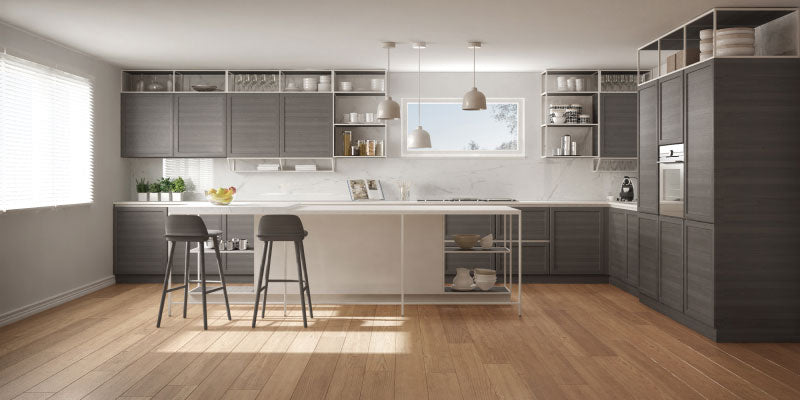
Bamboo Flooring vs Engineered Hardwood: What You Need to Know
|
|
Time to read 2 min
|
|
Time to read 2 min
When it comes to affordable and durable wood flooring, many homeowners are usually stuck between two choices: bamboo flooring vs engineered hardwood. If you’re on the fence about which flooring to install in your home, here’s what you need to know about making the choice between engineered hardwood and bamboo.
Unlike hardwood flooring, which is cut and milled into planks from natural solid wood, engineered hardwood is a hybrid of materials. The substrate or core material in engineered hardwood is usually made up of high-density fiberboard (HDF) or plywood, while the top layer is a hardwood veneer.
There are a number of pros when choosing engineered hardwood flooring for your home. For starters, the layers of engineered hardwood create a moisture blocker that makes the flooring more moisture resistant than solid hardwood. Because of this, many selections can be installed below grade. In addition, engineered hardwood is often priced lower than traditional wood floors and is much easier to install, which makes it ideal for DIYers.
On the other hand, the veneer on many engineered hardwood floor brands is often too thin to sand and refinish. This condition means that the lifespan of these floors is shorter than solid hardwood, which can be sanded and refinished multiple times. Likewise, the glues used to adhere the veneer to the core material can break down over time, resulting in separation.
If you picture rows of bamboo stalks lining your floor when you think about bamboo flooring, think again. Bamboo flooring actually closely resembles other wood flooring types, but it is made quite differently.
The raw bamboo is first boiled and steamed to remove the sugars and starches present in the natural material. Then hundreds of strands of raw bamboo are machine woven and pressed together to make the flooring. Bamboo is available in solid planks, planed to a desired finish, or in an engineered format that features a bamboo top layer.
Bamboo flooring has a number of practical benefits. Many bamboo options can last upwards of 50 years if properly maintained, although the average lifespan ranges from 20-25 years with normal family wear-and-tear. It is harder than most hardwoods, which makes it extremely durable. Additionally, bamboo is termite resistant and comes in a huge choice of stains and plank widths. The cost is generally less than traditional hardwood and, like engineered hardwood, bamboo flooring is easy to install for DIYers.
However, bamboo does have a few detracting points. For example, bamboo flooring that isn’t properly boiled, steamed, and dried can shrink after installation, causing unsightly gaps. In addition, bamboo doesn’t have a grading scale like most hardwood floors. This lack of scale can make choosing a quality bamboo flooring brand more difficult.
If you’re trying to decide between engineered hardwood or bamboo flooring for your home, weigh the advantages and disadvantages of each carefully before you commit to installing new flooring.
Bamboo Flooring |
Engineered Hardwood |
|
Pattern |
Unique from other wood floors: distinct verticle or horizontal grain pattern |
Real wood top coat: choose from almost any species |
Janka Range |
3,800 – 5,000 (max hardness) |
N/A |
Installation Site |
Below, on, or above grade |
Below, on, or above grade |
Installation Difficulty |
Moderate (Novice DIY-friendly) |
Moderate (Novice DIY-friendly) |
Price |
$1.50 – $12 per sq ft |
$4 – $12 per sq ft |
Lifespan |
20-25 years |
20-25 years |